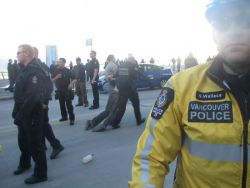Right to Protest, but not to Succeed: Some reflections on the We 8 the G8 Protest
BLOG POST posted on June 8, 2010 by Bahtman
On May 21, 2010 about 60 people gathered outside the Vancouver Art Gallery and marched to the Fairmont Pan Pacific Hotel to support one another in their opposition to the G8 University Summit taking place on the University of British Colombia campus over the May long weekend. The reasons and specifics of why all these people are opposed to international financial institutions, the neoliberalizing of the academy demonstrated through the merging of corporate/state/academic interests, and so forth are not the focus of this post. Everyone has their particular reasons for opposing the G8 University Summit and the G8/G20 more generally, what interests me here is the illussion of one’s democratic right to protest in so-called freedom loving democratic countries. I mean to discuss in brief the dichotomy of accounts of Friday’s protest before discussing the role of protest and its relationship to the liberal state.
If you believe the CBC’s coverage of this issue (see the CBC coverage: http://www.cbc.ca/canada/british-columbia/story/2010/05/21/bc-g8-protest... ) what you’ll see is a carefully constructed press release from the Police describing pushy protestors who were trying to storm a closed door meeting in a hotel. Dismayed that they couldn’t enter, they block an intersection to protest the delegates who were on their way to dinner in a tour bus. Mainstream media tells us that the protestors inflicted damage to police property and that they had to be removed.
What actually happened is considerably different. I witnessed with my own eyes: officers jeering and taunting peaceful protestors, from as petty as repeatedly stepping on an organizer’s foot like a delinquent child while she asked him to stop – to shoving an older woman off her bicycle, elbowing a woman in the breast, punching, screaming, kicking, and swinging at protestors, destroying protestor’s property (kicking bicyles, even forcibly cutting a man’s spokes off because the officer slammed his peddle into the wheel of man’s bike) seizing of people’s property without a warrant or any discernable due cause, and more. The alleged ‘storming’ of the hotel is a fiction, as the main event outside the doors of the hotel in question was a performance by a local choir called “The Solidarity Notes” and then a festive pinata and a few speeches.
The issue underlying this conflict of testimonies gets to the heart of the role of protest in contempory democratic society. It is imperative for liberal democracies to demonstrate that not only is protest allowed, it is facilitated and even encouraged. The government goes to great effort to establish “designated protest zones” and sometimes will even televise protestors into the room of the meetings they are seeking to protest to ensure that the privileged minority ‘hear the voice of dissent’ without disrupting business as usual.
The moment protest actually disrupts something however, (ie, succeeds) things ‘escalate.’ The anti-G8 Protest a few Fridays ago in Vancouver was entirely peaceful, and things got ugly when the police/hotel’s diversionary strategy to smuggle the G8 University heads out of the Hotel were identified and confronted by protestors who were able to figure out that the source of the protest (the wealthy heads of universities stowed away securely in a tour bus) was sneaking away and successfully rallied the group to block the bus’s path so that the protest could continue.
This is the moment when the police quickly transitioned from paternalistic chauvinists to angry, militant arms of state power. When it became clear that the protestors would not let the bus pass before they delivered their message, the police made a tactical decision that would get a nod of approval from Niccolo Machievelli. Hit them hard, hit them strong, make it quick, then control the framing of it in the media.
Police picked up their bicycles and used them as weapons against protestors. They had an officer walking around with a giant gun that looked like something from a science fiction movie. (Check it out on the VMC here: http://vancouver.mediacoop.ca/video/3509) They punched, shoved, kicked – did everything short of pistol whipping people – to clear the path so the hungry delegates on board would be able to get to their dinner before it got cold. Police ran alongside the bus as the driver, no doubt nervous about hitting civilians, was urged to “keep going” amidst the chaos that was quickly unfolding. (See one account on the VMC here: http://vancouver.mediacoop.ca/blog/mike/3470 ) In this moment, when the interests of the elite was actually threatened (and by threatened, of course I am referring to the horrible consequences of their dinner being less hot) the state had no recourse but to use violence to prevent peaceful, unarmed, protestors from delivering their message.
The moral framing of protest in mainstream media, especially in Vancouver on account of the 2010 Olympics, is carefully constructed by state propagandists to emphasize the benevolence of the state authorities and divide-and-rule tactics to diminish the chances of protests actually stopping something from happening. The state often does not succeed, as several examples of people blocking and chasing the Olympic torch from their communities illustrated, but these examples are not highlighted. When they are highlighted, it is always done in such a way as to build animosity against those who practice democracy in the streets and those who watch it unfold on their television screens. It is imperative for the State to highlight that we live in the “End of History.” Democracy must be seen to flourish perfectly here, afterall, it’s not like we’re Thailand, right? The protection of that nationalistic imaginary – that all the things that people might protest are really not big issues here in Canada (things like indigenous rights, the rights of women, environmental devastation, neoliberal funding cuts to that make it difficult or impossible for the poor to contest injustice in the state’s legal system, etc) insulates the state from criticism, and prevents the masses from feeling real connections with those who must take their struggle for a better society for all into the streets.
The site for the Vancouver local of The Media Co-op has been archived and will no longer be updated. Please visit the main Media Co-op website to learn more about the organization.


Comments
CBC's The National working on a documentary regarding the G8
Protest, it's your right
HUNTSVILLE - Am I protesting? Absolutely!
I had a call from Reg Sherren, correspondent for CBC's The National.
He was working on a documentary regarding the G8 in Huntsville.
http://www.topix.net/world/north-america/2010/06/cbcs-the-national-worki...